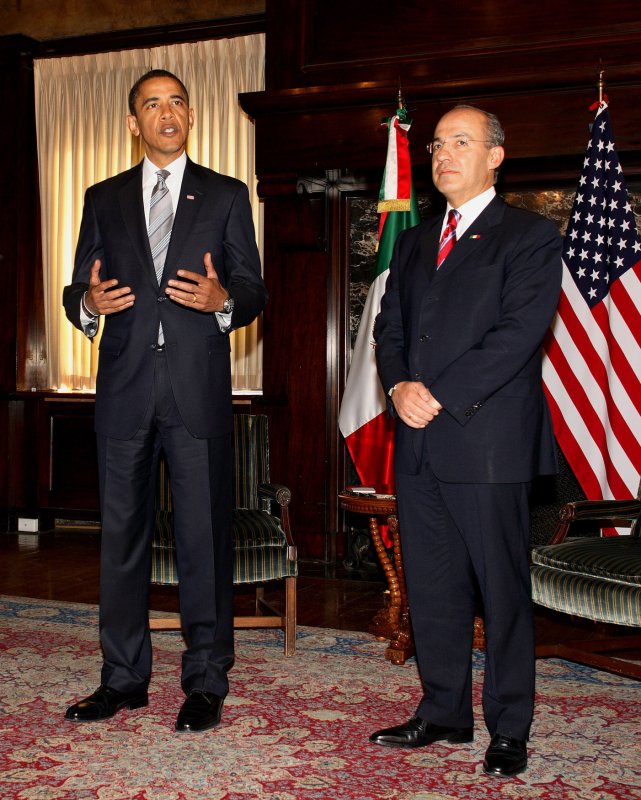1 of 3 | President-Elect Barack Obama meets with Mexican President Felipe Calderon at the Mexican Cultural Institute in Washington on January 12, 2009. (UPI Photo/Martin H. Simon/POOL) |
License Photo
WASHINGTON, April 17 (UPI) -- President Barack Obama completed a two-day visit to Mexico on Friday that was strong on symbolism but weak on substance.
Obama once again showed himself the master of the photo opportunity and publicized his support for Mexican President Felipe Calderon, who has shown exceptional courage and energy in fighting the immensely powerful and wealthy drug cartels that dominate northern sections of his country.
As the two leaders met, the Mexican army killed 15 gunmen serving one of the drug cartels in a shootout in Guerrero state in the southwest, where Acapulco is located. A soldier was also killed in the battle.
But on all the key policy issues currently dividing the United States and Mexico, there was no progress in closing gaps.
Calderon and his government are furious at Obama and the Democrat-controlled 111th Congress for axing a pilot program that allowed Mexican long-distance truckers to operate within the United States, but the program isn't going to be reinstated. Mexico has retaliated by imposing tariffs on a wide range of goods imported from the United States.
The Mexicans were furious at previous U.S. President George W. Bush for starting to build security fences along sections of the U.S. border with Mexico to cut down rates of illegal immigration. However, Obama, who voted for the 2006 Secure Fence Act as a U.S. senator from Illinois, is letting construction go ahead on two new sections of the fence, one in the Rio Grande Valley near Brownsville, Texas, and another in San Diego County, Calif., Greenwire reported Thursday in an article published on The New York Times' Web site.
So far, 613 miles of fence have been completed, Greenwire reported.
U.S. Secretary of Homeland Security Janet Napolitano has said she will review border-security programs. But she is continuing to implement the moves the previous Bush administration took to boost passive defenses, including fences and checkpoints on the U.S.-Mexican border.
Obama also angered Calderon by refusing to push for a ban on the free sale of semiautomatic assault weapons in the United States, including those with military features. A previous ban enacted by Democratic President Bill Clinton ran out in 2004, and President Bush refused to renew it. Obama has argued that he is in favor of such a ban but that it couldn't be effectively implemented. However, Clinton had no trouble in doing so.
The free sale of those weapons has been an enormous boon for the Mexican drug cartels that now easily outgun Mexican police forces in border provinces. That is a major reason why President Calderon sent the Mexican army into those regions to try to re-establish law and order.
The ongoing drug war in northern Mexico is a real one. Last year, more than 6,300 people died in it. That is close to double the total death toll in the Northern Irish Troubles in the 30 years from 1968 to the Good Friday peace agreement in 1998.
Obama's policy toward Mexico, in fact, apart from ending the prototype trucking program, is almost exactly the same as that of his predecessor President Bush. The keystone of his support for Mexico is the much-publicized $1.4 billion U.S. military-aid plan to the Mexican government and security forces to fight the drug lords. But that policy too was initiated by Bush and inherited by Obama.
The drug cartels pose an enormous threat to both the United States and Mexico. They feed the hugely lucrative appetite for dangerous, addictive illegal drugs in the United States. But their enormous power is also undermining the Mexican state from within. Experts on counterinsurgency and the phenomenon of fourth-generation war -- the undermining of state structures by non-state, extralegal forces -- have warned that if the Mexican state collapses or totally loses its power in the northern frontier provinces, a gigantic wave of illegal immigrants far larger than any previously seen would try to flee north to relative safety and prosperity in the United States, setting off an enormous U.S. domestic-security crisis.
Obama and Calderon fly Friday to Trinidad and Tobago to participate in the 34-nation Summit of the Americas this weekend. Obama is expected to use the occasion to open a new era of dialogue with communist Cuba under its veteran revolutionary leader Raul Castro.















